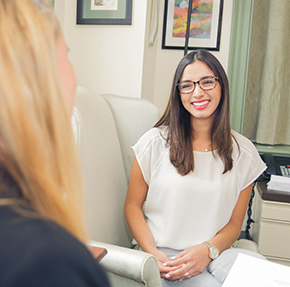
New Changes to M.A. in Human Services: 11 Concentrations to Better Serve Students

When Dr. Amy Trout came to Regent University’s School of Psychology & Counseling in 2006 to direct the Master of Arts in Human Services program, there were only a handful of students, most of them in full-time ministry or missions, who were looking for a better understanding of counseling skills and application without the need for a license. This unique and modifiable program quickly began to draw people from other professions who were seeking the same skill sets.
“With the growth came an interesting draw of students,” Trout said. “It’s just a great blend of folks that extract what they need out of the program and then use it in their applied situation.”
Today, Regent’s School of Psychology & Counseling is making changes to continue helping students in their specific settings. With 11 concentrations under the same umbrella of human services, students will be able to hone in on their own niche and gain the skills they need.
For Emily Oakley ’14, her experience in the program led to her starting her own nonprofit, Rebirth Ministries, which offers biblical counseling to individuals as well as training for youth leaders.
“I’d always had a passion for counseling, and I knew that I wanted to use it in a ministry setting, but I didn’t feel called to get a license,” Oakley said. “I not only learned how to better counsel people, but it offered so much healing in my own heart.”
Coby Dillard ’17 graduated in May and immediately put his experience to use in higher education. He is a veteran’s resource liaison and academic advisor at Tidewater Community College in Virginia Beach where he works directly with student veterans on some of their life issues. The program even inspired him to go back to school. He is now working on his Ed.S. for higher education leadership and management at Regent.
“The program is the foundation of everything I do,” Dillard said. “When I’m dealing with students on their personal issues I’m more aware of what some of those issues might be and how they can affect them in their academics, and I’m able to refer them to appropriate resources from there.”
When Dale Browning ’13 began the program, there were people placed in her life that she could encourage and support, and she wanted counseling skills grounded in a biblical foundation. While working as a massage therapist, Browning volunteers her time to helping others and meeting them where they are — whether it’s an emergency room, living room, a senior facility, or a rehab center.
“My experience at Regent was phenomenal,” Browning said. “The amount of support, even though it was online, was incredible; every professor was amazing.”
“It’s always been counseling and then we’ve worked with students to specifically tailor the program to their needs and industry,” Trout said. “Instead of students trying to piece it together for themselves, or for us to make assignments that will do that, the concentrations will do this for them.”
The program will offer six classes under the human services umbrella, and then students will take four more classes under one of the 11 concentrations. These specialized areas were determined based on student needs and partnerships with other schools within Regent. The concentrations include: Counseling; Addictions; Marriage and Family Ministry; Christian Counseling; Biblical Counseling; Life Coaching; Trauma and Crisis; Grief; Student Affairs; Conflict and Mediation Work; and Criminal Justice.
“We worked across the whole campus to see not only the need of our students but other students at Regent and how a human services degree could really help them,” Trout said.
As the program continues to grow, the potential exists to add more and expand the concentrations that are in place.
“We’re all unique and we all have individual gifts, so there’s not one way to do things, and that makes the body beautiful,” Trout said. “With the concentrations, students will be able to pick from a palette of options in addition to keeping the human services counseling track.”

